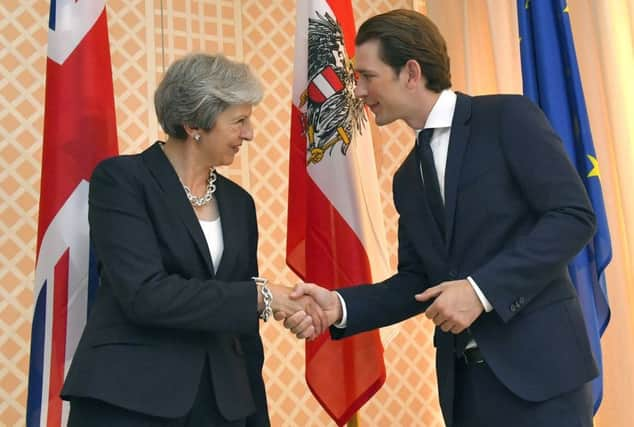Theresa May seeks allies in Eastern Europe over Brexit


Austrian Chancellor Sebastian Kurz, who hosted the Prime Minister at a music festival in Salzburg yesterday, said he believed Brexit talks were going “quite well”, but warned that the UK should seek the closest possible ties to the EU. Mrs May also held talks with the Czech Prime Minister Andrej Babis, who leads a Eurosceptic government that Downing Street hopes will speak up in favour of a EU concessions to grant the UK a good Brexit deal.
However, the Czech state secretary for European affairs said his government would not help the Prime Minister find “loopholes” in the EU negotiating position insisted there was unity behind Mr Barnier’s approach to the talks and the Prime Minister would struggle to find “loopholes” in the EU’s position. “It is almost physically impossible to have, at the same time, full regulatory autonomy on one side and full market access,” Ales Chmelar said.
Advertisement
Hide AdAdvertisement
Hide Ad“There needs to be a certain balance between the rights and obligations in those terms.”
This week saw the EU’s chief Brexit negotiator Michel Barnier deal the Prime Minister a serious blow by rejecting a key plank of her Brexit strategy, a “facilitated customs arrangement” under which the UK would apply EU tariffs and customs checks on goods in transit to the continent.
Mr Barnier said the EU “cannot and will not accept” a third country administering its customs rules.
That stance was backed by Mr Chmelar, who said it would be a “clear problem” for the EU to “not have a mechanism to control its borders”.
In spite of a warm welcome in Austria from Mr Kurz, there was little comfort for Mrs May in his remark before their meeting that the Chancellor viewed Brexit “very negatively”.
Mr Kurz added: “It has been taken by the British people so now we have to find a way to deal with it, and from our point of view it is important to avoid a hard Brexit”.
Former Brexit minister Steve Baker has claimed the EU is pushing the UK towards a possible “capitulation”, forcing it to choose between leaving without a deal or accepting Brussels’ terms.
Mr Baker, who resigned in response to Mrs May’s Chequers plan, said Brussels was attempting to get the UK to remain in both the single market and customs union.
Advertisement
Hide AdAdvertisement
Hide Ad“Chequers was bound to be the beginning of the EU pushing the UK to the unacceptable combination of EEA [European Economic Area] and customs union membership,” Mr Baker said on Friday.
“On this road, eventually we will reach a fork between final capitulation or exit with no agreement.”
Mr Baker said it would be “far better to find the political and administrative will to solve the problems of the UK border with Ireland through an advanced FTA [free-trade agreement]”.
Meanwhile, Eurosceptics warned against any attempt to extend the Article 50 process in the event a deal hasn’t been stuck by the UK’s exit date in March 2019.
That option was firmly rejected by Cabinet minister Liam Fox and influential backbencher Jacob Rees-Mogg, with Mr Fox warning: “To attempt to extend our membership even longer, many voters would regard as a complete betrayal by the political class, and I think they would be right.”
Mr Rees-Mogg, leader of the pro-Brexit European Research Group of Tory MPs, said: “Liam Fox is right, extending Article 50 is the definition of failure for the Government.”
Experts have warned that Mrs May’s Brexit blueprint will stop the UK from joining a new free trade agreement bringing together some of the world’s fastest-growing economies.
Free trade with the EU in agricultural and manufactured goods would make it “most unlikely” that the UK could also join the 11-member Trans-Pacific Partnership, according to a Policy Exchange think-tank paper.